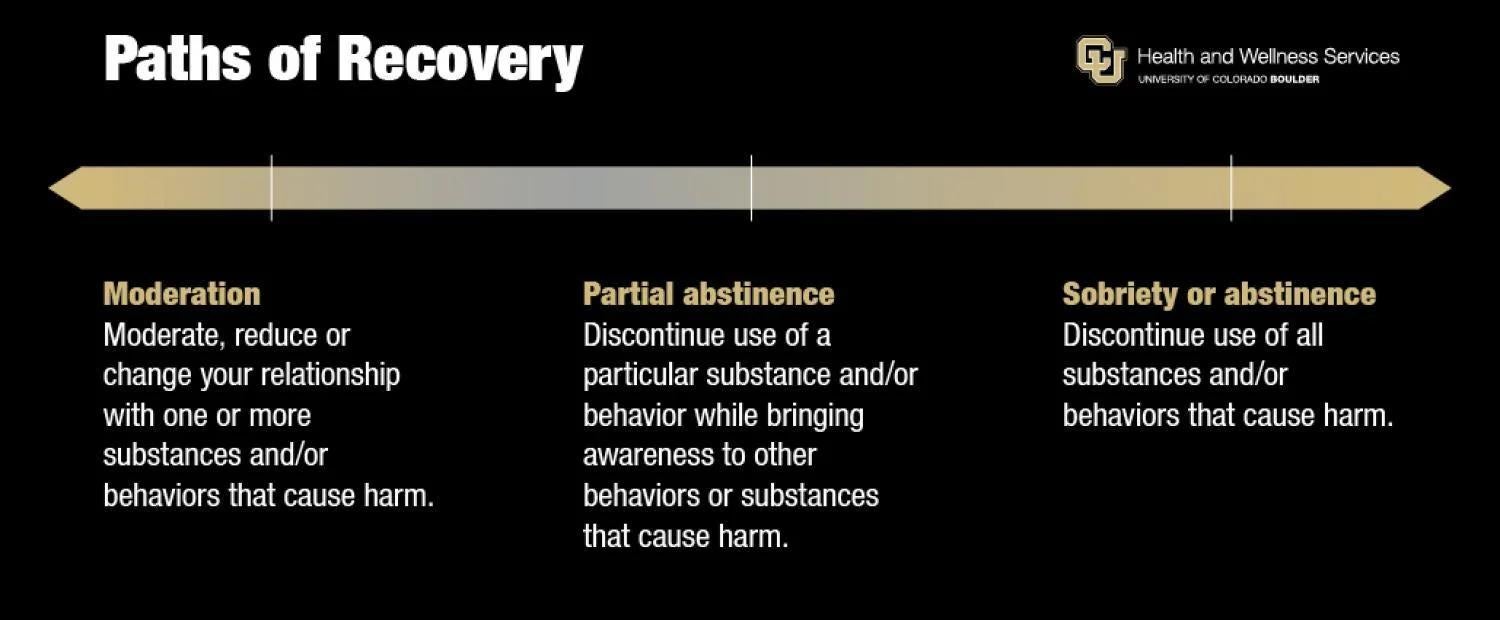
Connecting with others and belonging to a community can improve a number of areas of mental health. In fact, those who feel closely connected to friends, family and peers tend to have lower rates of depression, suicide and addiction.
Recovery can help us connect with others and give us a sense of belonging, support and purpose. Here are three things to know about recovery.
1. What is recovery?
In most alcohol and drug treatment settings, recovery often describes those who are participating in abstinence-based programs or 12-step groups like Alcoholics Anonymous (AA).
However, recovery can look different for everyone. At the Collegiate Recovery Community (CUCRC), recovery is defined by changing your life to improve your health, live a self-directed life and reach your full potential. This broader definition allows the CUCRC to support multiple pathways to recovery, including sobriety and moderation.
It’s also important to know that recovery isn’t exclusive to drug and alcohol use. In fact, recovery covers a broad range of behaviors like:
- Disordered eating/eating disorders
- Self-harm
- Gaming
- Gambling
- Sex/porn
- Internet/social media use
- Shopping
- Risk-taking
- Nicotine
- Steroids
- Caffeine
- Overworking
- Other addictive or harmful behaviors
While some of these behaviors may be normal to engage in, they can also be addictive or cause harm in our daily lives. People may also feel compelled to repeat patterns or behaviors that result in negative consequences or experiences.
2. How do I know if recovery is right for me?
There are many reasons why people seek out recovery. If you’re not sure if recovery is the right path for you, here are some questions to help you determine if recovery may be something to consider.
- Have substances or other behaviors negatively impacted your relationships, performance at work or school, mental health or physical health?
- Do you tend to repeat patterns of use or behavior that result in unwanted experiences?
- Has anyone expressed that they are concerned about you?
- Are you looking to build a community with others who are going through similar experiences?
- Are you looking to live a healthier or more balanced lifestyle?
If you answered yes to any of the questions above, recovery may present a pathway to change your life in a more positive direction. Remember that recovery is unique to everyone, and the CUCRC is available to help you find the path that is right for you.
3. What are the pathways of recovery
Recovery is dynamic and there is no one-size-fits all approach. In fact, recovery can look different for everyone depending on your personal goals and habits.
Here are a few examples of what recovery can look like:

Moderation
Moderate, reduce or change your relationship with one or more substances and/or behaviors that cause harm.
Partial abstinence
Discontinue use of a particular substance and/or behavior while bringing awareness to other behaviors or substances that cause harm.
Sobriety
Discontinue use of all substances and/or behaviors that cause harm.
Keep in mind that your path in recovery can change over time as your life changes course or as you learn more about your habits. Regardless of the path you choose, the CUCRC is here to provide community, connection and support to help you navigate recovery options on your own terms.
Recovery resources
CU Boulder has a number of resources related to recovery, substance use and overdose prevention.
Important note: CU Boulder recovery resources do not provide detox or inpatient treatment services. These resources are not affiliated with law enforcement or other disciplinary groups, such as Student Conduct at CU Boulder. Students who are interested in additional treatment options can be referred out into the community through CAPS or the CUCRC.
Collegiate Recovery Community (CUCRC)
The CUCRC provides support meetings, events and peer-support for students, staff and faculty interested in pursuing recovery. The CUCRC office is also open for studying, socializing and drop-in support.
Sober housing
The CUCRC offers dedicated sober housing for students on the north side of campus through their CORE Housing program. This program is open to full-time undergrad and graduate students who have been accepted into the CORE membership program and have a preferred six months of continuous sobriety from all drugs and alcohol.
Counseling and Psychiatric Services (CAPS)
CAPS provides a number of services related to substance use, including assessments, brief individual therapy, support for concerned friends and family members, referrals to campus and community resources, including suboxone treatment.
Free naloxone
Naloxone is an FDA-approved nasal spray that can temporarily reverse opioid overdoses without a prescription. Naloxone is available for free and anonymously without a prescription to all students, staff and faculty at the Health Promotion front desk on the third floor of Wardenburg Health Center. Students living in residence halls can also order free naloxone and fentanyl test strips online through our Safer Night Out Buff Box program. All Buff Boxes are delivered to a student’s residence hall for easy and convenient pickup.
Substance use workshops
Health Promotion provides workshops for students, staff and faculty to help you gain a better understanding of your relationship with substances and learn skills for effective behavioral changes. They also offer workshops related to being a recovery ally to those in your life who are struggling with substance use or other addictive behaviors.
Nicotine cessation
Health Promotion offers free quit kits, nicotine cessation coaching and tips for overcoming cravings. Call 303-492-2937 to schedule an appointment. The Apothecary Pharmacy at Wardenburg also has nicotine patches and gum available for sale over the counter.
Office of Victim Assistance (OVA)
OVA provides free, confidential counseling, advocacy, information and referrals for students, staff and faculty who have experienced or witnessed a traumatic event (current or past). They offer confidential reporting, 24/7 phone support and drop-in hours.
Additional resources
Check out additional campus and community resources, including 12-step programs, safer use services, campus departments and more.
Follow @CUHealthyBuffs on social for more tips, events and activites.
